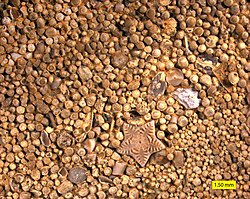Allochem

Allochem is a term introduced by Folk[1] to describe the recognisable "grains" in carbonate rocks. Examples would include ooids, peloids, oncolites, pellets, fossil or pre-existing carbonate fragments. Fragments are still termed allochems if they have undergone chemical transformations – for example if an aragonite shell were to dissolve and be later replaced by calcite, the replacement would still be deemed an allochem.[2]
The allochems are typically embedded in a matrix of micrite (lime mud) or sparry calcite.
References
[edit]- ^ Folk, R. L. (1959) Practical petrographic classification of limestones. American Association of Petroleum Geologists Bulletin. 43, pp. 1–38.
- ^ Scholle, P. A., and D. S. Ulmer-Scholle (2003) A Color Guide to the Petrography of Carbonate Rocks: Grains, textures, porosity, diagenesis. American Association of Petroleum Geologists Memoir no. 77. Tulsa, Oklahoma, American Association of Petroleum Geologists. 474 pp. ISBN 0-89181-358-6


 French
French Deutsch
Deutsch